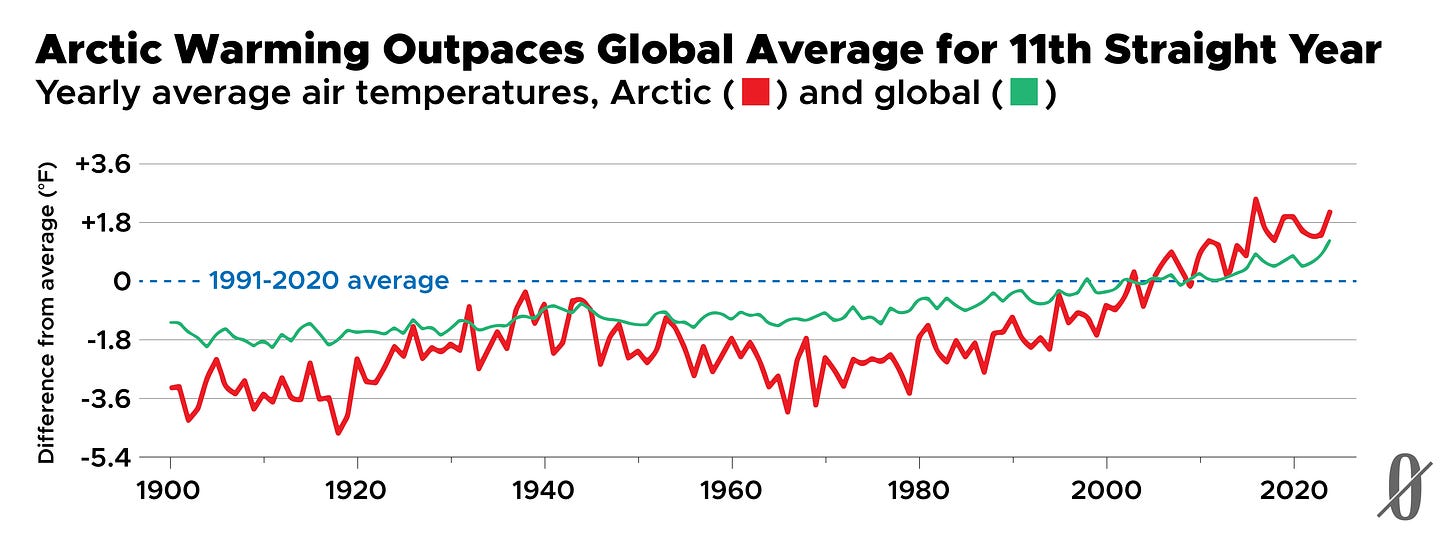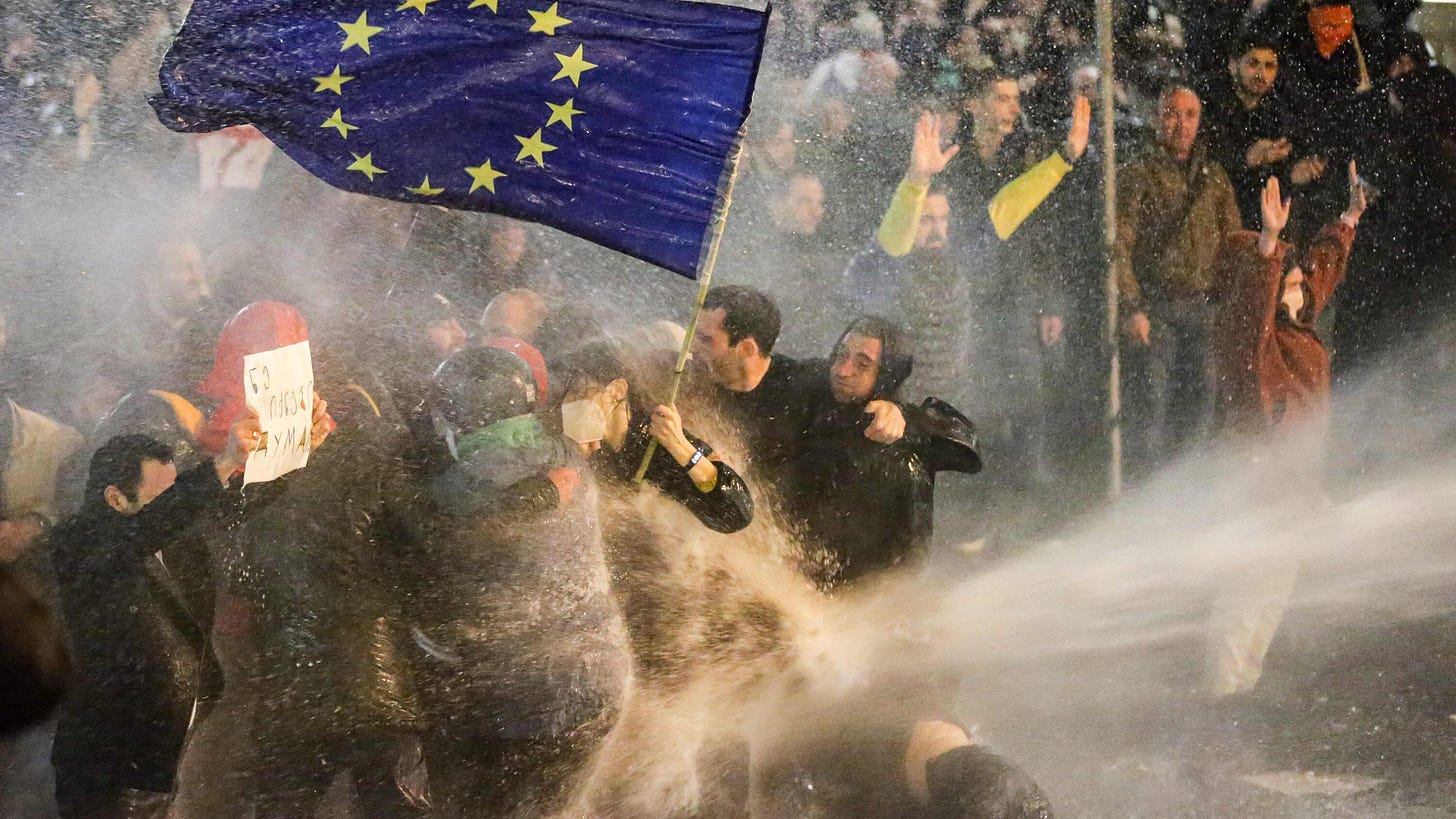US Fights Democracy Abroad
Plus: Purple MAGA? Elon’s climate change. AI floats parent murder. Trump’s anti-China ambassador. Cold War Watch. Blinkered Blinken. And more!
—South Korean authorities arrested former Defense Minister Kim Yong-hyun and prohibited President Yoon Suk-yeol from leaving the country, a week after the two collaborated to impose martial law. President Yoon, who last year charmed White House dinner guests with a rendition of “American Pie,” reportedly conspired with Kim to provoke a North Korean attack and use that as justification to arrest opposition lawmakers who were deemed insufficiently tough on North Korea and China. (For more on democratic backsliding among US allies, see below.)
—A new lawsuit against Character.AI alleges that one of its chatbots encouraged an autistic teenager to engage in self-harm and told him that “murdering his parents was a reasonable response to their imposing time limits on his online activity.” An October lawsuit against the company alleged that a 14-year-old boy’s relationship with a Character.AI bot led him to commit suicide. (See below for more AI updates.)
—Chinese regulators are investigating US chipmaker Nvidia for possible antitrust violations, a move that US observers saw as retaliation for American restrictions on tech exports to China. The New York Times says the Biden administration is pondering additional restrictions, and that China’s move reflects a “willingness to engage in supply chain warfare as the policy contest over trade and the control of technology escalates between the world’s two largest economies.”
—A bipartisan pair of US lawmakers urged the Biden administration to suspend sanctions on Syria following the fall of Bashar al-Assad’s regime over the weekend. The White House has yet to commit to such a move but is reportedly considering lifting terrorism sanctions on Hayat Tahrir al-Sham—the Islamist group that led the rebellion—in order to facilitate a western-friendly political transition. (See below for more on Syria.)
—This week Israeli Prime Minister Benjamin Netanyahu took the stand for the first time in his corruption trial, which began four years ago. Some analysts say Netanyahu has prolonged Israel’s war in Gaza to hold onto power amid legal and political challenges, a view that President Biden appeared to endorse this summer.
—The Arctic tundra—once an important “carbon sink”—is now releasing more greenhouse gases than it stores, according to a new study from the National Oceanic and Atmospheric Administration. Among the drivers of this shift are increasingly frequent Arctic wildfires and global warming itself, which causes permafrost to thaw and thus allows microbes in the soil to release stores of greenhouse gases.
Last week the top court of Romania annulled the results of the country’s recent presidential election, just days before a runoff between pro-EU liberal Elena Lasconi and right-wing populist Calin Georgescu. Georgescu had shocked the establishment with a strong first-round showing, but some opponents attributed it to Russian election interference via social media and other tools. The court, citing a declassified intelligence report, said it had found evidence of such meddling.
Many Romanians and outside observers have been outraged by the ruling. “Essentially, when all the layers are peeled back,” writes Thomas Fazi of Compact, “Romania’s top court annulled an entire presidential election based on a TikTok social-media campaign which the intelligence services claimed—without providing concrete evidence—bore similarities to Russia’s tactics allegedly used everywhere.” Even Georgescu’s opponent, Lasconi, who favors a western-leaning Romania that resists Russian geopolitical influence, decried the court’s decision, saying it “crushes the very essence of democracy: voting.”
If both candidates condemn the election annulment, who is taking the side of the court? Well, Washington, for one. In a carefully worded statement that avoided explicit endorsement of the ruling, the State Department said Romanians deserve confidence that their elections “are free of foreign malign influence”—and, for good measure, added that the US supports Romania’s “investigations into foreign malign influence.”
Romania isn’t the only country whose democratic backsliding the US has lately seemed willing to overlook in the name of fighting Russia’s geopolitical influence. In November, Georgian President Salome Zourabichvili said she won’t leave office when her term expires. Her reason: The electoral success of the Georgian Dream party—whose control of parliament allows it to choose her successor—was illegitimate, she said.
The Georgian Dream party has resisted western pressure to sanction Russia and send weapons to Ukraine, and it wants Georgia to maintain some distance from the EU. As in Romania, pro-EU politicians in Georgia have put forth unproven claims of vote rigging. And, as with Romania, the US has supported such claims. An October White House statement supporting them also complained that Russian officials had, in advance of the election, questioned the impartiality of election observers. “Russia’s attempt to undermine confidence in the observation of Georgia’s election is itself a form of interference,” the statement said. The White House statement didn’t say whether a White House statement undermining confidence in Georgia’s elections is itself a form of interference.
Though Biden has framed his foreign policy as a global struggle between democracy and autocracy, some foreign-policy analysts are questioning whether democratic values really matter much to Washington when geopolitical interests are at stake. In the case of Romania, writes Fazi, “The Western Alliance clearly can’t afford to allow mere popular sovereignty to jeopardize Romania’s role as a NATO garrison.”
Similar concerns may be at work in Georgia. In Responsible Statecraft, Almut Rochowanski of the Quincy Institute points to a recent X post by a regional analyst who used the phrase “geopolitical backsliding” to lament Georgia’s hesitation about EU accession. “That might have been a Freudian slip,” writes Rochowanski. “Or it might have been in earnest, normalizing the conflation of geopolitics with democracy that defines the West’s approach to Europe’s periphery.”
—In what appears to be a first, an AI company has organized an advertising campaign around an explicit appeal to “stop hiring humans.” Artisan, a startup that markets an AI sales agent named Ava, has posted billboards sporting that slogan around San Francisco. Other Artisan billboards say things like “Artisans Won’t Complain About Work-Life Balance.” Artisan CEO Jaspar Carmichael-Jack said the signs have succeeded in elevating the company’s profile and added, “they are somewhat dystopian, but so is AI.”
—IBM said it has developed a computer chip that can operate more efficiently than today’s chips by using fiber optics rather than traditional wiring and conveying information via photons rather than electrons. The company hasn’t yet released a version of the chip for commercial use, but it says the technology could accelerate the training of AI models by a factor of four while reducing energy consumption by a factor of five. Meanwhile, Google said it had passed a milestone on the road to developing a quantum computer that has practical value.
—Rep. Tom Kean of New Jersey sent letters to the CEOs of major American AI companies expressing concern about the industry’s attitude toward security and safety. “Publicly reported examples of security lapses and related concerns illustrate a culture within the AI sector that is starkly at odds with your company’s commitment to develop AI technology that embodies the principles of safety, security and trust,” Kean wrote. Kean sent the letter to the seven companies that last year made voluntary commitments to act responsibly: OpenAI, Google, Meta, Amazon, Microsoft, Anthropic, and Inflection. The letter singled out Meta, the only one among them that specializes in open-source models, for “reportedly not meeting draft standards issued by the Open Source Initiative.” It said Chinese companies had used Meta’s Llama large language model “to build powerful AI technology of their own.”
Is it time for purple MAGA hats? Trump’s movement is finding allies on Team Blue and scrambling the right-left political divide, writes libertarian commentator Jack Hunter in The American Conservative.
Hunter points to a recent post on X by left-of-center pundit Cenk Uygur, who wrote, “MAGA is not my mortal enemy… My mortal enemy is the establishment.” Matt Gaetz, Trump’s would-be attorney general, approvingly retweeted Uygur’s post, adding: “MAGA is not your enemy if you want to replace the mindless establishment with creative thinking…” Hunter saw the episode as evidence that the emerging political divide isn’t between left and right, but between the current establishment and the populists who want to take it down.
Another of Hunter’s data points: Two days after Uygur threw down the gauntlet, Sen. Bernie Sanders published an X post with a surprising first sentence: “Elon Musk is right.” Sanders went on to complain about the bloated defense budget, which Musk had criticized, as well as the lack of opposition in Congress to the “Military Industrial Complex.” Musk reacted positively to Sander’s post, and Gaetz replied: “Welcome home, Bernie.”
There were signs of such left-right convergence back in 2016, when 12 percent of Sanders primary voters threw their support to Trump in the general election. But the trend now seems more pronounced. And it may be reflected in voting patterns that were analyzed by Harvard law professor Nicholas Stephanopoulos in a Washington Post op-ed this week.
As Stephanopoulos notes, various kinds of traditionally Democratic constituents drifted toward Trump between 2020 and 2024. The most-discussed were Black and Latino voters, but there were several other such groups. “The near-disappearance of age as an electoral divide was even more dramatic,” he writes. Forty-seven percent of the youngest voters (ages 18 to 29) cast their ballots for Trump this year, compared to only 36 percent in 2020, while support for Trump among voters 65 and older stayed put at 51 percent. Other red-blue demographic divides—rural-urban and (according to some surveys) male-female—also became less pronounced.
Stephanopoulos says these trends amount to “depolarization.” But it’s not clear that this term, as conventionally understood, really applies.










